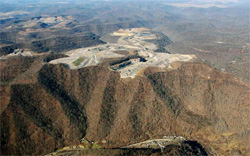If blowing off the tops of mountains to get at coal deposits seems archaic and ridiculously destructive, that’s because it is.
But until now, even the best efforts to stop this practice, often led by people who live in West Virginia’s "coal country," have been unsuccessful.
Thanks to a lawsuit filed by environmental groups, the second-biggest mountaintop removal coal company, Patriot Coal, agreed to end the practice altogether.
The deal forbids Patriot from applying for new large-scale surface mining projects and forces it to retire mountaintop-mining infrastructure by 2015. On existing mines, it will cut surface mining activities in half by 2018, from 6.5 million tons expected in 2014. In exchange, Patriot got an extension on installing selenium pollution-control equipment at some West Virginia mines.
"This news marks the beginning of the end of mountaintop removal mining. This is the first time a coal company is publicly acknowledging community impacts of this destructive and extreme form of mining," says Liz Judge of Earthjustice.
The lawsuit was filed to force Patriot to clean up selenium pollution that’s running into streams and rivers from two mountaintop sites in West Virginia. It was filed by Sierra Club and Appalachian groups – West Virginia Highlands Conservancy and Ohio Valley Environmental Coalition.
When the groups won the lawsuit, Patriot, which is going through bankruptcy, decided mountaintop mining is too expensive. $400 million in clean-up costs is not a sustainable business model, the company admitted.
Patriot issued the following statement:
"Patriot Coal has concluded that the continuation or expansion of surface mining, particularly large scale surface mining of the type common in central Appalachia, is not in its long term interests. Today’s proposed settlement commits Patriot Coal to phase out and permanently exit large scale surface mining and transition our business primarily toward underground mining and related small scale surface mining.
Patriot Coal recognizes that our mining operations impact the communities in which we operate in significant ways, and we are committed to maximizing the benefits of this agreement for our stakeholders, including our employees and neighbors. We believe the proposed settlement will result in a reduction of our environmental footprint."
Besides dynamiting off the tops of some of the most biodiverse mountains in the US, strip miners simply dump the debris (rocks, soil, contaminants) into the valleys, often burying – and killing -streams (not to mention animals).

"It’s time for investors to follow through and start putting funds in clean energy industries like renewables, that could create 52,000 new jobs in the four Appalachian states alone," says the Appalachian Regional Commission.
22 peer-reviewed scientific studies over the last several years have found significantly higher mortality rates, life-threatening disease and cancer rates, and birth defect rates in areas closest to mountaintop removal mining, in addition to environmental devastation
"We’ve been saying for many years that if companies had to pay the real costs of mountaintop removal, it would not be economically feasible," says Cindy Rank of West Virginia Highlands Conservancy. "Hopefully, it’s now become clear that when coal companies are required to prevent illegal selenium pollution and pay the costs for cleanup themselves it’s simply doesn’t make economic sense to continue this destructive form of mining."
